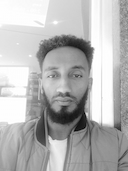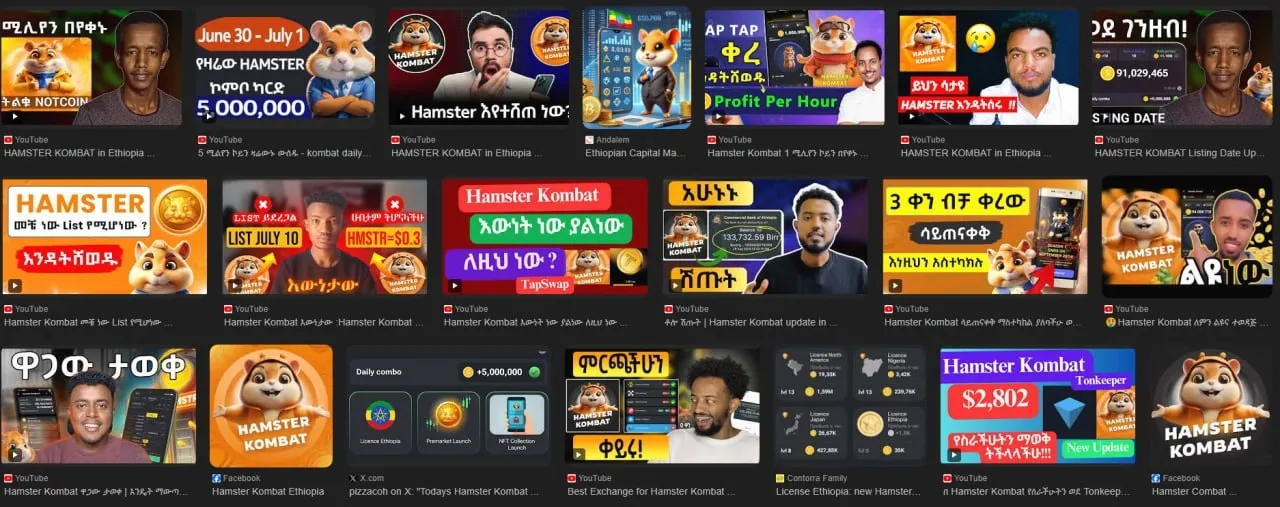Progress for 0 ad
Progress for 1 ad
Progress for 2 ad
Progress for 3 ad


Munir Shemsu
Addis Ababa, Ethiopia

Seeing urbanites tapping at their smartphones rarely invites a second glance in a city like Addis Ababa. Yet, the intense attention engulfing many faces in the past few months is too uncanny to ignore. Taxi commutes, service queues, and family gatherings feature at least a few people patting ceaselessly at images on a screen. At first glance, one might assume they are rapidly liking a social media post of some kind or playing some new addictive game, but a closer look reveals something all too peculiar. These people are busy at ‘work.’
Hamster Kombat, a viral Telegram sensation promising lucrative payouts at some future date, had many recruiting family and friends via links while they played the part of a ‘CEO’ on the Mini app. Users are tagged as CEO's as they perform different tasks (mostly tapping) to earn tokens on the platform. Hamster is by far the most popular among the hundreds of Play-to-Earn(P2E) games that have swept the globe over the past year.
However, the galloping hype came to a screeching halt a few weeks back as memes of disappointment replaced earlier pronouncements of financial wizardry.
Nahom Mekib, 30, flung his phone in a fit of rage on the late September afternoon that was set to be a joyous occasion. Over the past five months, the IT technician spent hours daily tapping on a chubby Hamster’s image as he awaited the pending payout. He was far from alone in his newfound obsession, as people from every social status, creed, and age group devoted hours to the plump pet.
After hearing from a distant friend that sizable payouts were given out on a similar click-to-earn Telegram game (Notcoin), Nahom was expecting a few hundred dollars’ worth of tokens to flow into his crypto wallet.
“I feel duped,” he told Shega after receiving HMSTR tokens worth less than 1000 birr.
Thousands of Ethiopians echoed the sentiment as long hours of ‘work’ flushed down the drain for what was touted as a historic digital currency milestone.
A wave of social media 'influencers' contributed to this trend, positioning themselves as self-appointed experts in a nascent, obscure space. Content creators like Jason Peters, founder of Ethio Tech with JP, were among the online personalities who acquired significant engagement and authority on the topic on apps like TikTok. Several others have also cultivated their respective followings with Amharic tutorial-like YouTube videos.
Unfortunately, most of these online personalities have chosen silence in recent weeks with the players having only themselves to blame.
In mid-2018, Nikolai and Pavel Durov, the co-founding brothers of Telegram, introduced The Open Network (TON), a unique blockchain architecture enabling cryptocurrency functionality on the social media platform.
As the easily accessible infrastructure caught some wind and issued tokens (digital keys), the US Securities Exchange Commission (SEC) filed a restraining order. It forced later development responsibilities to be passed onto the NewTon foundation and an online open-source community. The SEC argued that tokens functioned like typical securities in capital markets, requiring a full disclosure process informing investors of the exact nature of the items being purchased. A dispute that presages subsequent developments in an emerging space significantly removed from traditional legal frameworks.
TON relaunched in 2021 to become a highly valued digital asset currently being traded at a little over five dollars. Driving the value of this digital asset is a comprehensive suite of tools that allow developers to create decentralized apps on Telegram. TON fuels transactions, enable governance, and establishes a stable infrastructure where a social gaming frenzy can blossom.
In 2023, Telegram launched the Mini Apps feature, which allows developers to create lightweight applications for gaming, shopping and the like that operate within the platform. By January it allowed the Mini Apps to integrate with the TON blockchain infrastructure unlocking new capabilities for the developers. More than half of Telegram's 950 million users are estimated to be interacting with at least one mini-app every month.
Some of the mini apps on the platform became niche services in a short while, with a few like Hamster and Notcoin garnering worldwide appeal.
The Hamster craze reached a global fever pitch in mid-June, prompting allegations by Iran’s military that it was part of the West’s “soft war” amid the country’s elections. The anonymous developers denied the election tampering claim via email in response to media inquiries.

As with most successful ideas, Hamster Kombat modified the tap-to-earn model from a viral sensation just a few months back. In an all-too-similar format, millions were tapping on a giant image of a coin with a triangle on it in hopes of reaping some final reward. Unlike Hamster, its predecessor NotCoin retained public confidence (a valuable asset in the speculative currency market) as it delivered on most of its initial value proposition.
Notcoin garnered nearly 650,000 users within a few weeks of its introduction on Telegram in early November. What started out as an experiment into user engagement ended up being a somewhat rewarding financial adventure for nearly 40 million people.
One of the beneficiaries, Yohannes Tesemma, earned around 4870 tokens worth 172 dollars during the coin's peak. The 28-year-old’s initial excitement faded within a week as Notcoin’s value dropped by more than half.
“I was mad about it (dropping) and sold it there,” he recalled to Shega.
Currently, a single Notcoin is valued at around $0.008106 (subject to high fluctuation) with a market capitalization of above 800 million dollars, according to estimates by CoinGecko, a crypto tracker website.
While still dabbling with some currencies, Yohannes plans to focus on trading coins in the long run, deeming the time spent on crytpo games as wasteful relative to the energy they demand. He emphasizes the need to engage in these games only during one’s free time, especially with more rewarding online projects paying in cryptocurrency for ‘actual’ work.
“Never focus on airdrops,” the computer science graduate recommends.
Tap-to-earn games are a subgenre of play-to-earn (P2E) games. They allow players to earn in-game rewards, often in the form of cryptocurrencies or Non-Fungible-Tokens (NFTs), through simple and repetitive actions like tapping the screen. The core gameplay involves performing easy tasks, making these games highly accessible, especially for those new to the crypto world.
These games often include additional features to keep players engaged, such as daily missions, referral programs, and upgradeable boosters. Once they accumulate enough currency, they can convert it into real cryptocurrency tokens.
Tap-to-earn games like Hamster Kombat derive their value from a combination of factors, including tokenomics, gameplay and community, market speculation and hype, and the overall interest in these games and cryptocurrencies.
According to Coin Desk, tokenomics determines two things about a crypto economy: the incentives that set out how the token will be distributed and the utility of the tokens that influence its demand.
Bitcoin’s tokenomics, for instance, dictates that no more than 21 million coins can ever be mined, with the last coin expected to enter circulation around the year 2140. NFT (non-fungible token) projects take scarcity to the extreme; some collections might mint only a single NFT for a piece of art.
In addition, some blockchains or protocols "burn" tokens—permanently remove them from circulation—to reduce the supply of coins in circulation to support their price as the remaining tokens in circulation become more scarce.
And this is exactly what the Hamster Kombat team did. Millions across the globe united in their frustrations as the unknown team of developers deemed nearly 57%, or around 169 million users, ineligible for the highly anticipated airdrop—a term that means free coin giveaways in the cryptocurrency space. Social media platforms like TikTok buzzed with hashtags of disillusionment as “the biggest airdrop in history” fizzled to a flimsy puff.
Hamster Kombat’s developers also banned a further 2.3 million accounts for alleged cheating while revealing that 12% of the tokens would be withheld for next season.
A series of tweets on X, formerly Twitter, by the developers a day before listing contributed to the 100-fold drop in the coin’s value, which debuted at 0.1$. Season two, which means more tapping but now with diamond earnings instead of coins, was teased by the shadowy developers as millions regretted the hours spent tickling the hamster.
A team of 50 developers reportedly managed the vast social media presence of Hamster, which included the biggest channel on Telegram with 53 million members, an X account with over 12 million followers, and 18 channels on YouTube commanding north of 35 million. Some have estimated the ad revenue from social media at tens of millions of dollars (perhaps the main motif), while others viewed it as an introductory experimental course into Web 3. Telegram’s recently jailed founder Pavel Durov lauded Hamster, which relies on his messaging app, as a way to introduce blockchain to a wider audience.
Nonetheless, the cascade of ephemeral digital products touted as revolutionary under the generic Web3 label remains obscure to millions in low-income countries.
Ethiopian industry insiders like Kal Kassa, founder at BitcoinBirr, paint a nuanced picture of the prospects of the digital bridge to Web3. He highlights the ambiguity of the term, noting how its meaning shifts depending on the context promoted by its advocates
“A marketing term with no solid definition,” Kal dubbed it.
He indicates how cryptocurrencies, NFTs, app games, and everything in between get the Web3 denomination. The advisor emphasized the need to conduct analysis of liquidity, volume, and demand before hopping on every crypto-bandwagon.
“Understanding of the product is critical,” the advisor told Shega.
He referred to the SEC’s intervention in the US to highlight potential regulatory involvement in Initial Coin Offerings (ICO) as the Ethiopian Capital Market Authority (ECMA) gets solid footing.
Solomon Bekele, a senior advisor at the ECMA, points out the need to delineate if something qualifies as a security when evaluating the relevant disclosure obligation. He indicates how the nature of a security, be it digital or analog, does not shield it from regulatory compliance upon issuance.
“Does it qualify as a security is the main question,” Solomon told Shega.
Nevertheless, regulatory oversight could remain a challenge stemming from the transnational nature of the digital currency infrastructure and the constant evolution of products and services. Furthermore, the figure it out as you go model in determining the valuation of the newer tokens accentuates the final disappointments.
Kal notes Bitcoin mining involves building data centers, purchasing electricity, and making capital investments as opposed to the airy nature of recent digital products. A balance of responsible marketing, participant vigilance, and informed decision-making is crucial in the emerging space, according to the founder.
As thousands of Ethiopian youth explore the prospects of quick financial gains in an evolving space, a tempered zeal might be prudent. With digital currencies ranging from Cats, Dogs, and even mogul-inspired Musk meme coins becoming ever more accessible to a populace just dipping into the digital space—cautionary steps could prove wise.
👏
😂
❤️
😲
😠

Munir Shemsu
Munir S. Mohammed is a journalist, writer, and researcher based in Ethiopia. He has a background in Economics and his interest's span technology, education, finance, and capital markets. Munir is currently the Editor-in-Chief at Shega Media and a contributor to the Shega Insights team.
Your Email Address Will Not Be Published. Required Fields Are Marked *
1
19 October 2024
Finally! Thanks for addressing the hype in all the relevant sides.